Key takeaways:
- Effective communication, such as regular stand-up meetings and active listening, is essential for enhancing team collaboration and understanding.
- Utilizing collaborative tools like GitHub, Slack, and Trello can significantly improve workflow, project management, and engagement among team members.
- Constructive feedback during code reviews and fostering a supportive atmosphere can strengthen team bonds and lead to skill enhancement.
- Measuring success in collaboration includes assessing outcomes, celebrating milestones, and acknowledging individual learning and growth from the collaborative process.
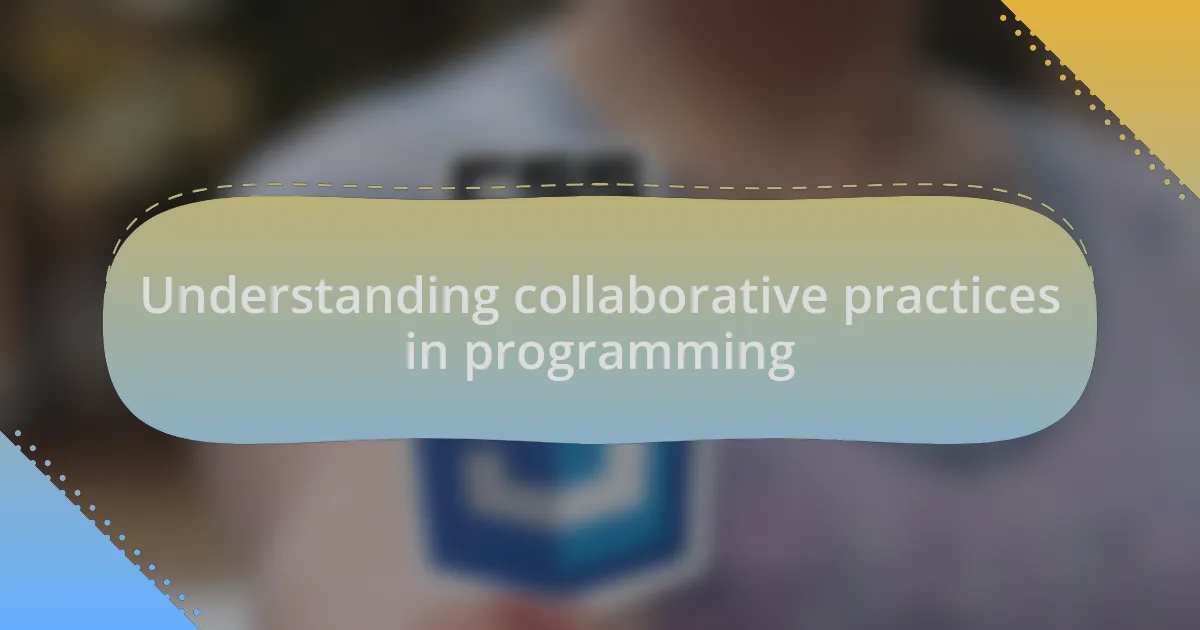
Understanding collaborative practices in programming
Collaborative practices in programming are all about leveraging collective knowledge to create something greater than what any single individual could achieve. I recall a time when I worked on an open-source project, and seeing how my inputs blended seamlessly with others’ expertise truly opened my eyes to the power of collaboration. Have you ever thought about how sharing ideas can spark innovation?
Effective communication is at the heart of successful collaboration. I remember a project where regular stand-up meetings allowed team members to voice their concerns and share updates, which dramatically improved our workflow. Wouldn’t it be interesting to explore how different communication tools can influence the way teams collaborate?
In programming, utilizing pair programming can enhance understanding and reduce errors. I once paired with a novice developer, and through guiding her on best practices, I realized that mentoring not only solidifies my own knowledge but also fosters a supportive learning environment. This begs the question: how often do we take the opportunity to teach and learn simultaneously in our work?
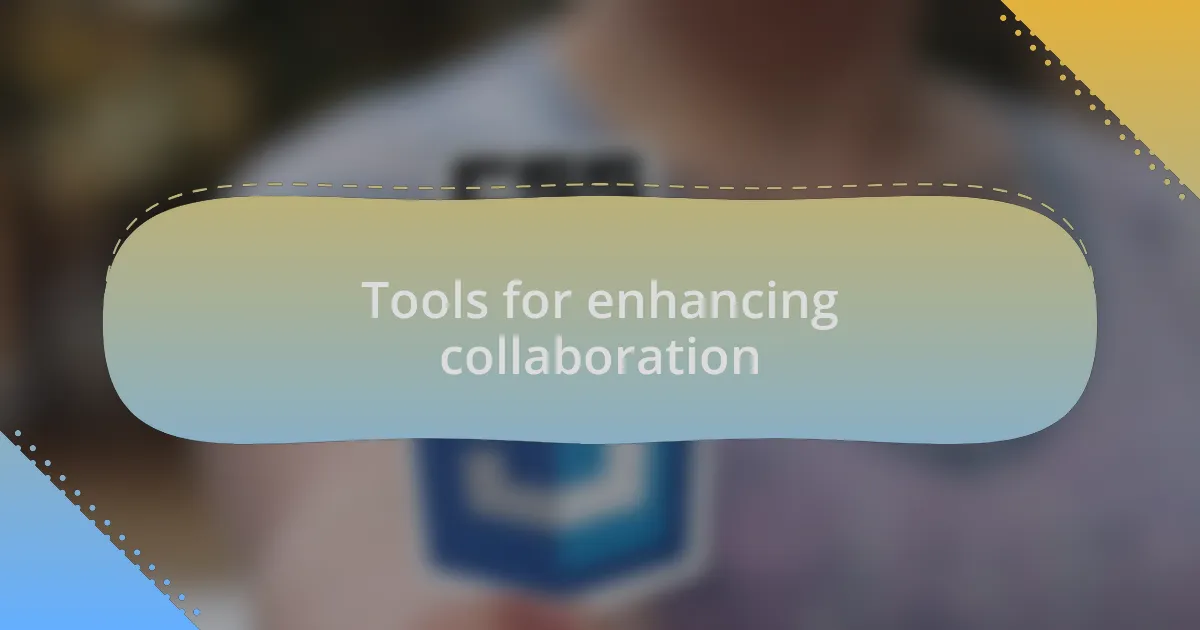
Tools for enhancing collaboration
When it comes to collaboration, choosing the right tools can make a world of difference. For instance, I once integrated GitHub for version control in a team project. The intuitive interface allowed us to track changes seamlessly, and the pull request feature encouraged thoughtful code reviews. Have you tried using GitHub? The blend of code sharing and feedback turned our coding sessions into educational exchanges.
Another invaluable tool I’ve encountered is Slack. It’s like a virtual water cooler where ideas flow freely. In one project, we created dedicated channels for specific tasks, making it easy to keep track of conversations relevant to our goals. I found that the quick back-and-forth fostered a sense of immediacy and urgency, which motivated us to brainstorm solutions collaboratively. How has instant messaging reshaped the dynamics of your team?
Lastly, utilizing Trello for project management was a game-changer for me. I still remember the rush of moving tasks from “To Do” to “Done.” It brought a tangible sense of progress that kept the team energized. I think visualizing our workload in such a structured way provided clarity and helped align our priorities effectively. Have you ever used visual tools to enhance your team’s focus? It’s truly empowering to see everything laid out and to stay connected on who’s doing what.
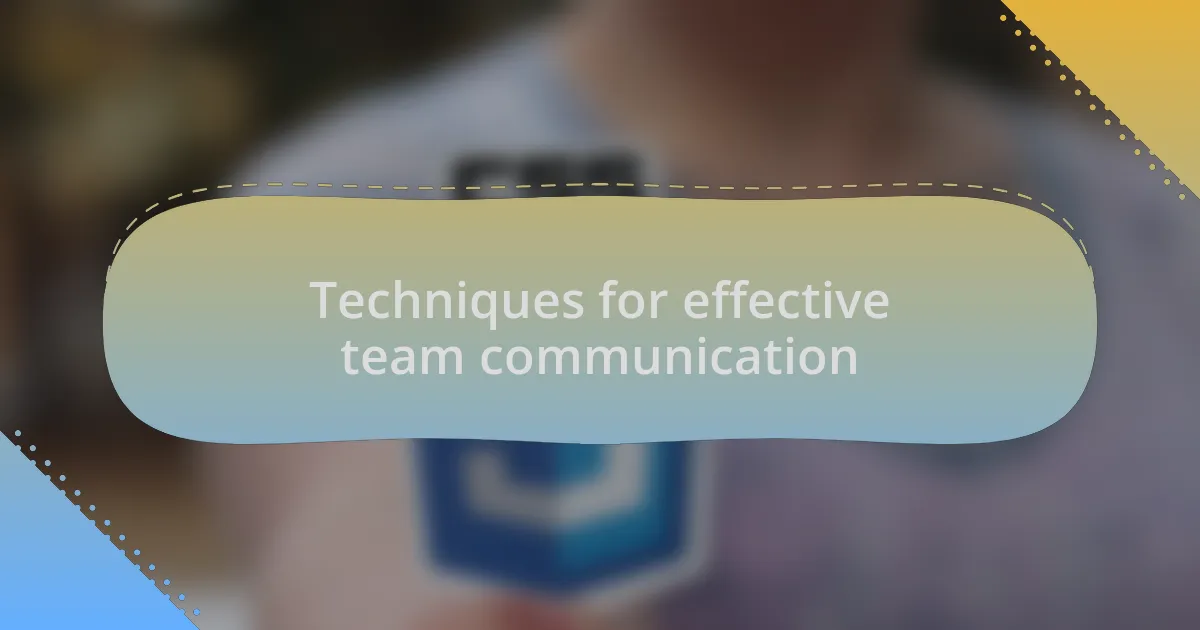
Techniques for effective team communication
Effective team communication hinges on clarity and openness. I’ve found that setting up regular stand-up meetings can bridge communication gaps. During these brief check-ins, I encourage everyone to share their current progress and challenges. It’s amazing how a 15-minute discussion can surface issues before they grow and keeps everyone aligned. Have you experienced a shift in team dynamics through regular check-ins?
Another technique I prioritize is active listening. Early in my career, I learned that sometimes, it’s more important to listen than to speak. By consciously focusing on my teammates’ ideas, I noticed how it fostered mutual respect and deeper understanding. When my team feels heard, it builds trust and encourages more open dialogue. Have you ever noticed how a simple nod or appreciative comment can spark further creativity?
I can’t stress the importance of feedback enough. I make it a point to seek constructive insights after code reviews; it’s not just about what went wrong, but also recognizing what went well. In my experience, this not only enhances my coding skills but also strengthens team bonds. Don’t you think that encouraging each other through feedback could be a game-changer for motivation?
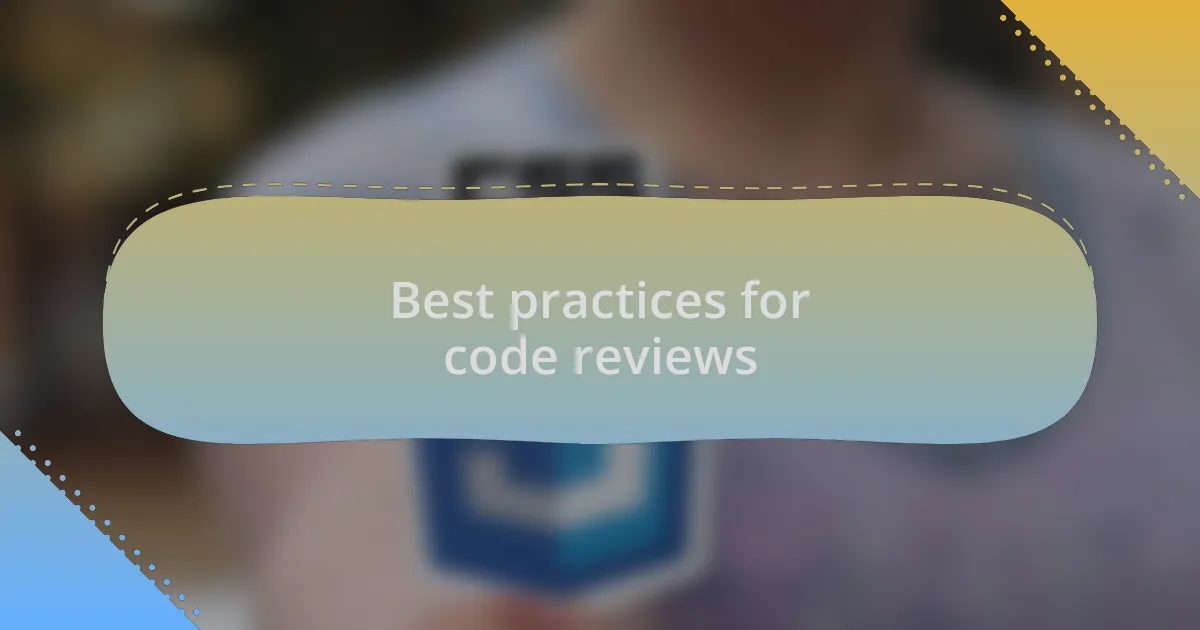
Best practices for code reviews
When it comes to code reviews, clarity is paramount. I’ve found that providing specific comments rather than vague feedback makes all the difference. For instance, instead of saying “this could be better,” I always try to specify what needs improvement and why it matters. Do you remember a time when precise feedback helped you learn something crucial?
Establishing a collaborative atmosphere during reviews can transform the experience. I personally enjoyed sessions where we practiced pair programming; not only did it allow for real-time problem-solving, but it also created a sense of teamwork. It’s fascinating how a shared screen can lead to vibrant discussions and innovative solutions. Have you ever had that moment where two minds working together just clicked?
Incorporating automated code review tools has been a game-changer in my workflow. Initially, I was skeptical, thinking it might take away the human element. However, I quickly realized that these tools catch basic errors, allowing me to focus on deeper, more insightful discussions during the review. Isn’t it great when technology enhances our human efforts rather than replaces them?
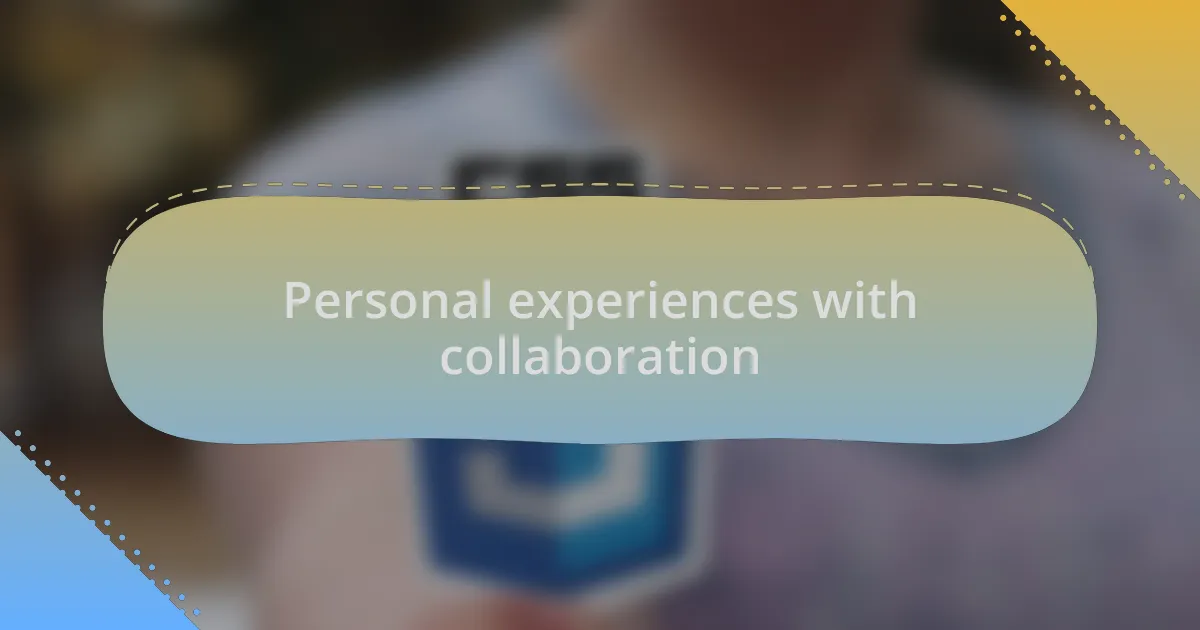
Personal experiences with collaboration
There have been numerous occasions where collaboration has sparked innovative ideas in my projects. I recall a specific instance where my team and I gathered in a coffee shop to brainstorm features for a web app. The energy of bouncing ideas off one another led to a breakthrough moment—one idea ignited another, and before we knew it, we had a solid blueprint that none of us could have created alone. Have you ever felt that surge of creativity when collaborating in an informal setting?
In my experience, tackling challenging problems as a group can be incredibly rewarding. There was a time when our team faced a particularly complex bug, and rather than dividing the work, we all sat together and unraveled the issue through open dialogue. This approach fostered a sense of camaraderie, and we ended up not only solving the problem but also learning from each other’s unique perspectives. Isn’t it amazing how teamwork can turn obstacles into opportunities for growth?
Reflecting on my collaborative experiences, I’ve learned that communication is the bedrock of successful teamwork. One time, during a project deadline crunch, I made it a point to check in with my teammates frequently, ensuring everyone felt supported and heard. That proactive communication not only eased the pressure but also built trust among us, creating an environment where we felt comfortable sharing ideas without hesitation. How do you think consistent communication could elevate your own collaborative projects?
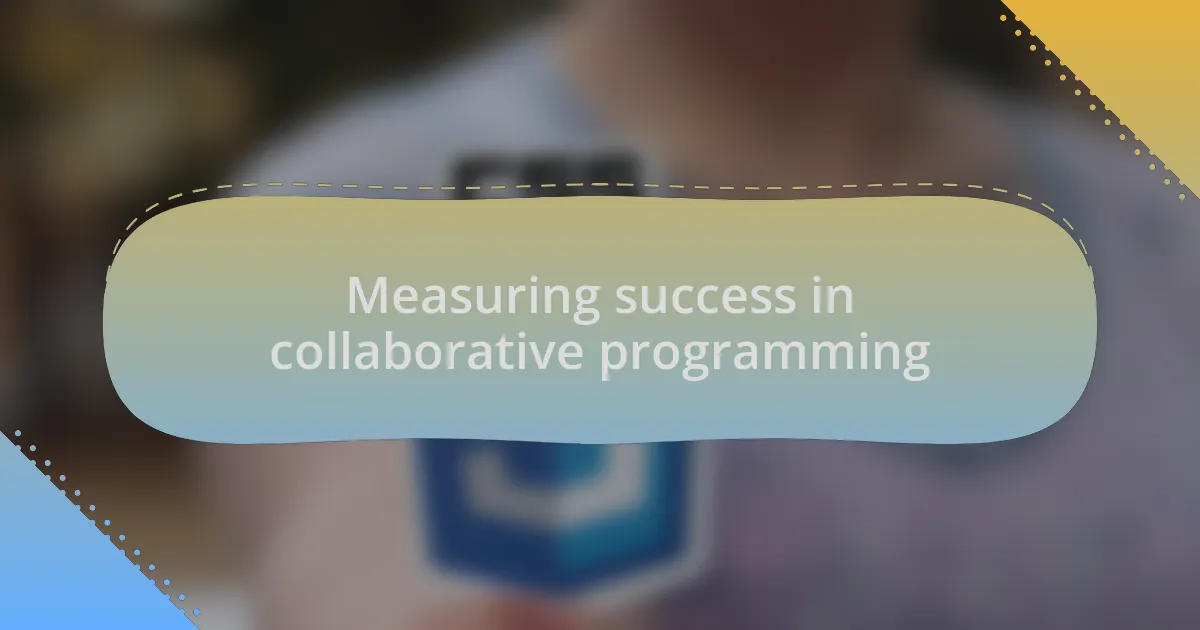
Measuring success in collaborative programming
Measuring success in collaborative programming involves evaluating both the outcomes of the projects and the dynamics of the team itself. In one of my past collaborations, we developed a project management tool that not only delivered on its technical requirements but also enhanced our team’s workflow. We used feedback surveys and retrospective meetings to assess how effectively we communicated, and I was surprised to discover the extent to which my teammates valued transparency throughout the development process. Isn’t it fascinating how a simple metric like feedback can redesign the framework of future collaborations?
Another critical aspect I emphasize in gauging success is the ability to meet shared goals. During a recent project, my team set specific milestones and tracked progress through a shared dashboard. While we ultimately achieved our functional goals, what truly stood out to me was how our collaborative spirit flourished as we celebrated each milestone together. I can honestly say that the excitement generated by our collective achievements was a measure of success we hadn’t anticipated. Don’t you think celebrating small victories could foster a more motivated team atmosphere?
Lastly, I believe that the learning outcomes of collaboration should always be a key measure of success. On one occasion, my team paired off to solve a specific coding challenge. What I found remarkable was how each member walked away with new techniques and insights that improved our individual skills. Seeing the tangible fruits of our collective knowledge left me reflecting on how much we could learn from each other beyond just the project’s end goal. How often do you take the time to evaluate what your team members have gained through their collaborative efforts?